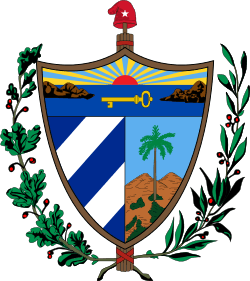Canada–Cuba relations
 |
|
Canada |
Cuba |
|---|---|
Canada has maintained consistently cordial relations with Cuba, in spite of considerable pressure from the United States, with the island being one of the most popular international travel destinations for Canadian citizens.
History
Canada established diplomatic relations with Cuba in 1945, and maintained uninterrupted diplomatic relations following the Cuban Revolution in 1959.[1] Cuba was the first country in the Caribbean selected by Canada for a diplomatic mission.[1]
Relations were especially warm in the 1970s and 1980s during the time when Pierre Elliot Trudeau was the Prime Minister of Canada. Trudeau spent three days in Cuba and sparked a lifelong friendship with Fidel Castro.[2] The visit was also the first by a Western nation to Cuba since 1960.[2]
Fidel Castro was among Pierre Trudeau's pallbearers at his funeral in 2000.[3]
Canadian-Cuban business ventures
In 1994, a joint venture was formed between the Cuban Nickel Union and the Canadian firm Sherritt International, which operates a mining and processing plant on the island in Moa.[4] A second enterprise, Cobalt Refinery Co. Inc., was created in Alberta for nickel refining.
There are in total 85 Canadian companies and subsidiaries operating in Cuba, including brewer Labatt Breweries and Pizza Nova.[5]
Criticism of U.S. policy
Canada has been critical of the U.S. trade embargo against Cuba, and strongly objected to the Helms-Burton Act. In 1996 Foreign Affairs Minister Lloyd Axworthy stated: "Canada shares the U.S. objectives of improving human rights standards and moving to more representative government in Cuba. But we are concerned that the Helms-Burton Act takes the wrong approach. That is why we have been working with other countries to uphold the principles of international law".[6][7]
In 1996 a Private Member's Bill was introduced, but not made law, in the Canadian parliament; this law called the Godfrey-Milliken Bill was in response to the extraterritoriality of the Helms-Burton Act.[8][9] Godfrey-Milliken was essentially a parody, and would have allowed descendants of United Empire Loyalists who fled the American Revolution to be able to reclaim land and property that was confiscated by the American government in the 1700s.
Canada has also protested U.S. preclearance customs agents in Canadian airports who tried to catch American citizens traveling to Cuba in defiance of U.S. law.[10]
Diplomatic representation
Canada has had an embassy in Havana since 1945. The embassy is located in the upscale district of Miramar in municipal area of Playa in Havana.
Cuba has an embassy in Ottawa and consulates in Toronto[11] and Montreal.[12]
See also
- Foreign relations of Canada
- Foreign relations of Cuba
- Canada–Latin America relations
- Cuba–United States relations
- Cuban Canadian
References
- 1 2 "Canada - Cuba Relations". Government of Canada.
- 1 2 Robert Wright (2007). Three Nights in Havana: Pierre Trudeau, Fidel Castro and the Cold War World. HarperCollins. ISBN 978-0-00-200626-2. OCLC 184967828.
- ↑ "Castro mourns for Trudeau, who stood up for him". CNN. 2000-10-03.
- ↑ "History of Sherritt". Sherritt International.
- ↑ "News in Depth: FAQs on Canada-Cuba trade". Canadian Broadcasting Corporation. 2006-08-03.
- ↑ "Online NewsHour: Lloyd Axworthy". Public Broadcasting Service (PBS). 1997-01-23.
- ↑ "Ottawa Objects To Helms-Burton". The Militant. 1996-03-18.
- ↑ "BILL C-339: The Godfrey-Milliken Bill". Archived from the original on 2013-06-18.
- ↑ "LEGISinfo: Private Member's Bill C-339 (35-2)". Government of Canada.
- ↑ "Canada opposes U.S. crackdown on Cuba visitors". International Bicycle Fund. 2001-09-01.
- ↑ "Consulate General of Cuba in Toronto". Embassy of Cuba in Canada.
- ↑ "Consulate General of Cuba in Montreal". Embassy of Cuba in Canada.
